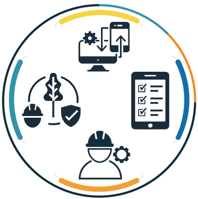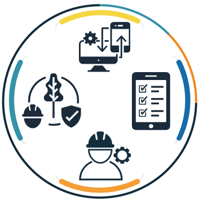On March 6, the U.S. Securities and Exchange Commission (SEC) adopted new rules for climate-related disclosures for investor reporting and registration statements. Similar to the Climate Corporate Data Accountability Act recently signed into law in California, the new SEC rules will require some publicly traded companies to begin reporting greenhouse gas emissions, any associated climate risks, and any plans or processes for mitigating those risks, such as moving away from fossil fuels.
High-level view of the new rules
After facing initial opposition, the final rules were modified to exclude Scope 3 emissions, which are indirect emissions that are not directly controlled by an organization but occur either along the supply chain or when a consumer uses a product. Though environmental groups argue that Scope 3 emissions make up the large part of any company’s carbon footprint, these indirect emissions are often difficult for companies to track and report.
Scope 1 (direct) and Scope 2 (indirect from energy used by the organization) emissions will be required to be disclosed if the company deems them “material” or having a significant impact on the business strategy, operations or financial status. All qualifying climate disclosures will need to be included in a company’s SEC filings (annual reports and registration statements), rather than merely on a company’s website.
See the full scope of the rules and requirements on the SEC’s announcement.
The SEC’s finalized rules will affect publicly traded companies in the U.S. as well as foreign companies with business in the U.S. The SEC estimates that roughly 2,800 U.S. companies and around 540 foreign companies with business in the U.S. will need to comply with the new rules.
Potential legal challenges looming
Though the final version of the rules were passed in a final vote of three to two, the U.S. Chamber of Commerce has already expressed strong opposition of the rules and is already suing California over its similar act. In addition, 10 states are filing a challenge to the SEC rules with the U.S. Court of Appeals for the 11th Circuit, according to West Virginia Attorney General Patrick Morrisey. Other opponents insist that the SEC is overstepping their bounds of simply preventing fraud in security exchanges and investments.
Take steps now for compliance
Regardless of the potential for litigation, reporting will begin in fiscal year 2026 for the largest companies, while smaller companies will begin disclosures in fiscal year 2027. (Note that smaller companies will only report disclosures but not emissions.)
It’s important to read and fully understand the rules and stipulations now, and begin putting systems in place to collect and compile the necessary data. If you aren’t already tracking your greenhouse gas emissions or making plans for decreasing your carbon footprint, it’s time to introduce processes for tracking metrics and KPIs to set a baseline for current status and uncover insights for making future changes.
Ideagen DevonWay has the tools your company needs
As the global trend toward reporting climate risks and the attempts to minimize those risks continues to grow, companies will need to continually evolve and become more agile with changing regulations. Fully understanding the environmental, social and governance (ESG) initiatives needed to meet sustainability goals and requirements will become increasingly important.
Ideagen DevonWay’s ESG & Sustainability software has the capabilities to both track ESG metrics and introduce better performance initiatives to meet and exceed ESG goals. Just as importantly, the fully configurable nature of the software means that as regulatory requirements inevitably change, our customers’ implementation of those requirements specific to their operating environments can easily change with them.
Schedule a demo today to learn more about how we can simplify and support your climate risk reporting needs as well as strategize for mitigation initiatives.






